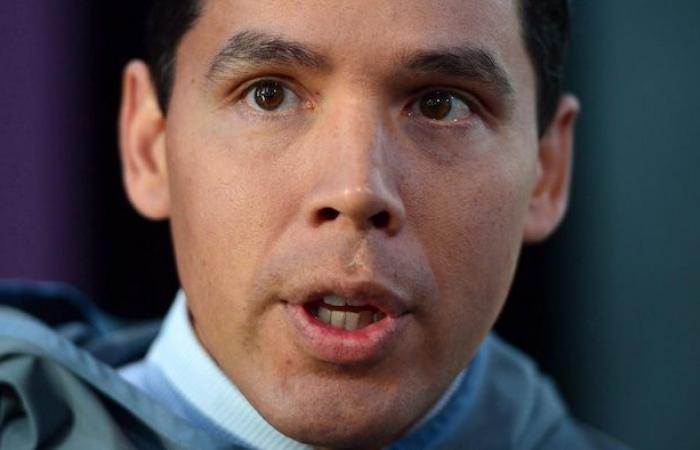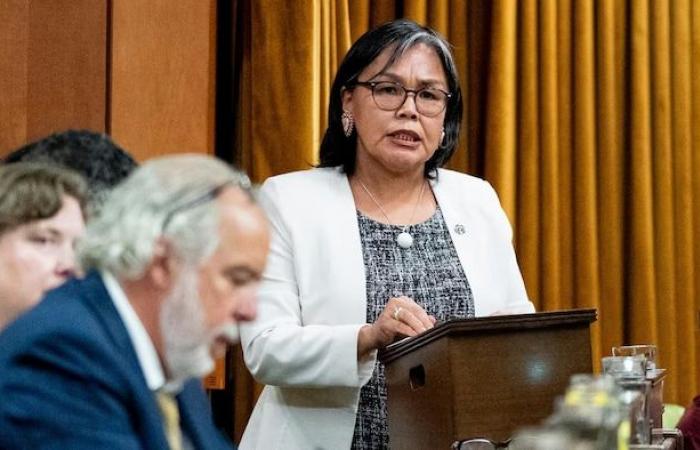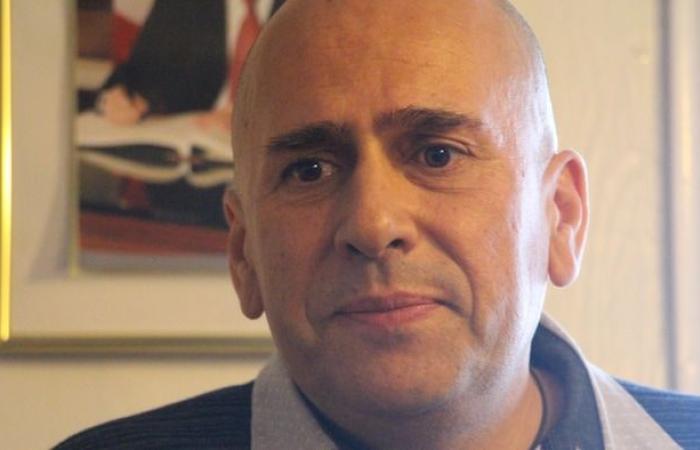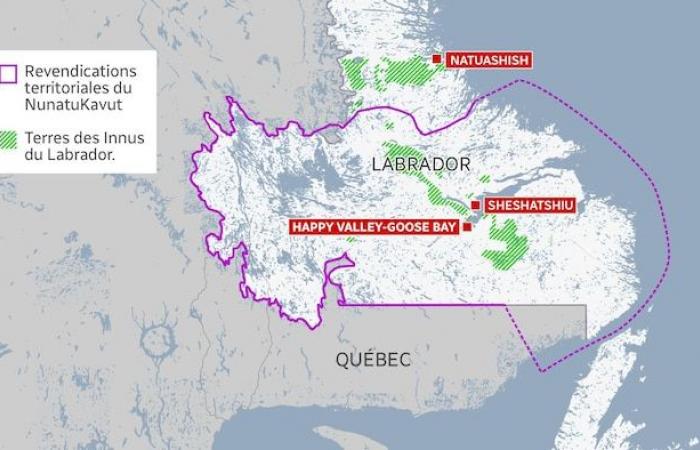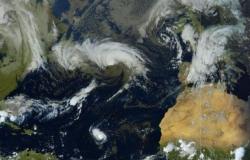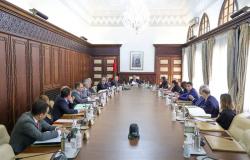Natan Obed, president of Inuit Tapiriit Kanatami, an organization that represents about 70,000 Inuit across Canada, said he wrote to Prime Minister Justin Trudeau more than a year ago to express his concerns (new window) regarding the NunatuKavut Community Council’s ability to receive federal grants and allocations relating to fishing.
These are grants based on a simple self-declaration of Inuit identity
he argues.
Mr. Obed adds that he has not received a response from Ottawa. Having this conversation is a defining part of Canada’s future
specified the president of Inuit Tapiriit Kanatami during a recent interview.
Otherwise, we are headed for another wave of dispossession where non-Indigenous Canadians choose to be Indigenous in order to take what they feel is theirs.
The leader of the Inuit Tapiriit Kanatami, Nathan Obed. (File photo)
Photo: The Canadian Press / Sean Kilpatrick
The disputed organization targeted, the NunatuKavut Community Council, has received nearly $74 million in federal funding since 2010, particularly for Indigenous programs or projects related to their claims to an Indigenous identity, according to government data.
Controversial subsidies
The latest amount – $161,108 – was approved last month by Environment and Climate Change Canada for a project on conservation and species at risk. This amount came from the department’s Aboriginal Fund for Species at Risk program.
NunatuKavut is not indigenous
wrote Nunavut NDP MP Lori Idlout on Wednesday on the X platform in response to a previous message on funding.
Lori Idlout in the House of Commons, September 16, 2024
Photo: The Canadian Press / Spencer Colby
In June, the Council received a special allowance
for the recently reopened northern cod fishery in Newfoundland and Labrador, allowing its fishermen to receive a portion of the year’s total catch.
Fisheries and Oceans Canada said in a statement that it maintains a well established relationship
with the NunatuKavut Community Council as an indigenous organization
. He also said the group had historically received various licenses and funding from Indigenous programs.
The NunatuKavut Council says it represents some 6,000 self-identified Inuit in southern and central Labrador. He is not recognized as Inuit by any other federally recognized Inuit organization, including the Nunatsiavut government, established in northern Labrador.
The Council was previously called the Labrador Métis Nation and the Labrador Métis Association.
Until February, the group offered memberships alliance
in addition to its regular memberships and those for its non-residents.
According to a document that has since been removed from the Council’s website, ally membership could be granted to an Indigenous person, resident of Labrador, who supports the objectives of NunatuKavut, but who does not meet the conditions for full membership [de l’organisation]
.
These members can benefit from indigenous representation, from different measures
and of government-sponsored services and programs
indicates the document.
NunatuKavut defends
NunatuKavut President Todd Russell said the Council proposed this type of membership as a gesture of inclusion towards Indigenous people He did not hint
to provide them with support and services. When this type of membership became a source of confusion during negotiations over rights and recognition with the federal government, the council got rid of it, he said in an interview.
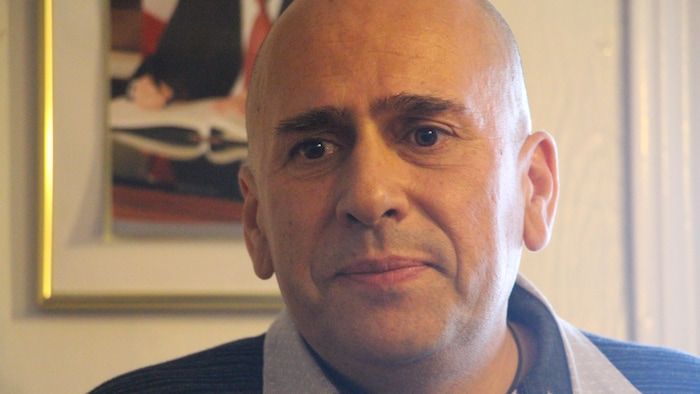
The president of NunatuKavut, Todd Russell. (File photo)
Photo : Radio-Canada / Katie Breen
All indigenous groups have such discussions about who belongs and who does not, he said. It’s the madness
to oppose the recognition, funding and allocation of resources to NunatuKavut as an Indigenous group, Mr. Russell added.
We have always been an Aboriginal organization and we have always represented Aboriginal people who otherwise would not have found representation in other Aboriginal groups in Labrador
he indicated.
From Métis to Inuit
Inuit leader Natan Obed retorts that his organization rejects the idea that a group can claim to be Métis and then reconstitute oneself
as an Inuit group.
Mr. Russell said Mr. Obed is not responsible for determining who is or is not Inuit. We know who our grandfathers are. We know where we come from
he declared.
The Métis National Council said last year it supported Natan Obed’s efforts (new window) to draw attention to what he called the fraudulent claims
of NunatuKavut regarding his Inuit identity. He also called on the federal government to end its support for the group.
However, according to Todd Russell, the Métis National Council took this position because of a political campaign
sustained led by Mr. Obed.
The NunatuKavut Council has long put forward a memorandum of understanding dated 2019 that it signed with the federal government, according to which the group is a Indigenous collective capable of holding Aboriginal rights under section 35
.
In June, the Federal Court rejected the challenge (new window) aimed at invalidating the federal recognition of the Nunatukavut group. The Court concluded that the memorandum of understanding constitutes only an expression of goodwill and political commitment; it does not create, modify, recognize or deny any legal or constitutional obligation or right with respect to either party
.
For its part, the Ministry of Crown-Indigenous Relations stressed that the agreement reflects the government’s intention to resolve outstanding questions
regarding the rights that NunatuKavut may hold and who may benefit from them.
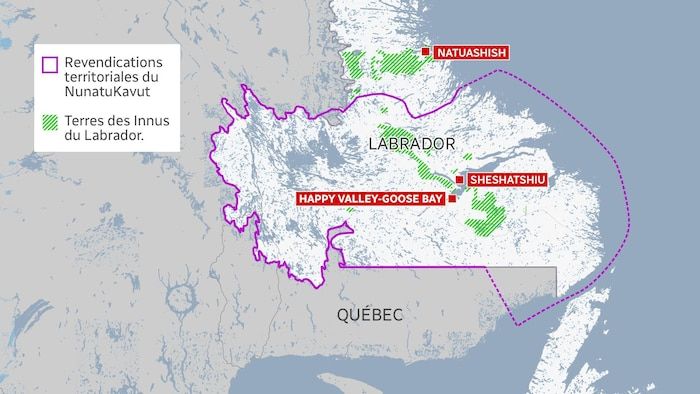
A map showing the land claims of NunatuKavut and the lands of the Labrador Innu.
Photo: Radio-Canada / Louise Duguay
The government has not started negotiations substantial
with the group to find out whether it should have rights under the Constitution, spokesperson Pascal Laplante said in an email.
Mr. Laplante specified that NunatuKavut receives funding from the ministry under two programs: one for recognized indigenous organizations and one for non-indigenous organizations
currently in discussions with the ministry.
Another form of colonialism
Mr. Obed fears that a risk-averse federal government does not want to be seen as judging who is Indigenous and who is not. Instead, he said, he has been too inclusive and appears unwilling to make things right.
This new form of colonization, in which non-Indigenous Canadians become Indigenous and then materially benefit from Indigenous peoples, is now a new and normalized thing.
He also fears that the current Liberal government cannot resolve the problem with the Inuit in good faith and quickly
since Mr. Russell was a Liberal MP from 2005 to 2011.
Todd Russell rejected the allegation, saying Natan Obed was maintaining a very good relationship
with Ottawa.

